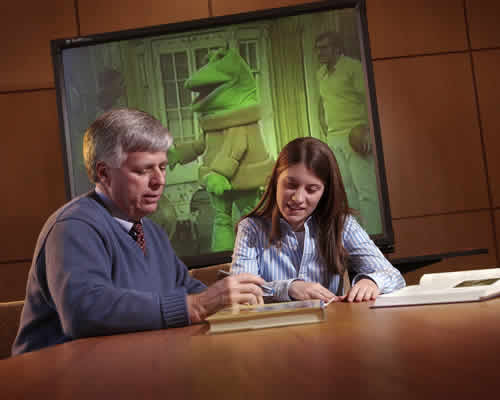After completing an internship in New York City this summer, Sarah Lyons ’06 (Larchmont, N.Y.) turned her hands-on work experience into an intensive research project on children’s media and the importance of doing research with children to improve the quality of programming.
During an internship at Little Airplane Productions, a company producing children’s television shows, Lyons, a double major in psychology and Spanish, worked with a professional psychologist to test the quality of television programming in England. She was able to sit in on group sessions where children viewed the programming. They were then asked a series of questions about the quality and interaction levels of the show.
“I think the only way you can understand what the children think of the show is to test them,” she says. “I had the opportunity to observe the research and take an active role in the process.”
After Lyons observed several sessions, she conducted her own and interacted with the children one-on-one. She also sat in on meetings and participated in conference calls to England. The work was dedicated to strengthening the script and overall quality of the television show.
Lyons wrote a research paper combining her experience at Little Airplane Productions with further research on the topic. She worked under the guidance of Alan Childs, professor and head of psychology.
“She used literature to explain and interpret what she observed this past summer as the process of producing these [children’s television] programs,” Childs says. “The goal of independent studies is to learn as much as one can from the literature, then to produce a significant paper which synthesizes this reading, and in Sarah’s case, relate that reading to what she saw as the way these principles were used by the production company . . . in producing children’s television programming.”
Lyons says that the importance of psychological research in television programming is very apparent.
“Psychology tests the quality of what’s being done,” she says. “At first, I didn’t really think you could use psychology in this sense. Now I think it benefits people everywhere.”
Although Lyons says it was difficult initially to find research for her independent study, she was able to use Lafayette’s resources to find relevant material.
“Public search engines weren’t doing the trick,” she says, adding Lafayette’s computer network allowed her to find journals that deal with her specific topic.
She even taught Childs some things about the business.
“I knew little about how television production companies worked, nor the degree to which they used psychology theories or research in their business,” he says, adding that he enjoyed learning more about it via e-mails from Sarah throughout her summer internship. “I have enjoyed Sarah’s obvious enthusiasm for her summer experiences, but also her interest in examining the psychological literature about the influence of television on children.”
Lyons believes that children’s programming is an important tool in teaching children valuable lessons. Techniques such as animation, songs, and word repetition help to capture children’s attention and get them interested in the subject matter, she notes. Testing the children helps to let scriptwriters know what has a positive effect on them.
“When the children would point and scream, that would make the scriptwriters happy,” she explains. “Different personalities reacted in different ways.”
Lyons says that throughout the internship and the independent study, Childs showed genuine interest in her work.
“Professor Childs is highly qualified for this position,” she says. “He has helped me and challenged me to my full potential.”
She also has felt challenged academically by Lafayette’s environment. “The professors and students here are enthusiastic and their enthusiasm has helped to motivate me,” she says. “The small campus and tight-knit atmosphere is conducive to the work that I’ve done.”
“It is significant that Sarah was able to combine her internship experience with a scholarly interest in psychological theories and research. I think it is typical of the Lafayette Experience that students are limited only by their interests and creativity in pursuing valuable projects which will enhance not only their education, but also their ultimate career choices,” Childs says.
Now that Lyons has had the opportunity to research the importance of psychology in children’s programming, she hopes to pursue this interest even further at Lafayette. She is planning to take child development and educational classes to further her knowledge.
Lyons is a member of the Delta Gamma sorority and has participated in philanthropic activities such as Adopt a Grandma and the Breast Cancer Walk.
She is a graduate of Mamaroneck High School.
Independent study courses are among several major opportunities at Lafayette that make the College a national leader in undergraduate research. Lafayette sends one of the largest contingents to the National Conference on Undergraduate Research each year. Forty-two students have been accepted to present their work at the annual conference this month.

Sarah Lyons ’06 studied children’s media and programming in an independent study with Alan Childs, professor of psychology.
